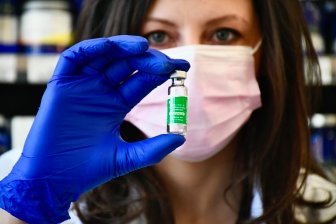Nova Scotia’s top doctor says the halt on the use of AstraZeneca COVID-19 vaccine on younger people doesn’t mean the vaccine is unsafe, and the province is waiting on more information.
On Monday, the National Advisory Committee on Immunization recommended that AstraZeneca not be used on people under the age of 55. That was in response to reports that some three dozen patients in Europe developed blood clots after receiving the vaccine.
Chief medical officer of health Dr. Robert Strang addressed NACI’s update on the AstraZeneca vaccine in a Tuesday COVID-19 briefing.
“In the past few weeks there’s been an increased number of reports from Europe of rare but serious cases of blood clots, associated with low levels of cells that help the blood clots, platelets.
“This is following the immunization with the AstraZeneca vaccine,” said Strang to reporters.
“Most of the cases have been women under the age 55 and about 40 per cent of them have died.”
Strang said that a definite link between the vaccine and these cases has not been made, but it is suggestive.
“We know that there have been no similar blood-clotting events reported in Canada and no similar blood-clotting events reported anywhere in the world with the mRNA vaccines.”
Health Canada announced Monday it is requiring AstraZeneca vaccine manufacturers to conduct a detailed assessment of benefits and risks by age and gender of Canadians.
Until then, the National Advisory Committee on Immunization has called an immediate pause on the use of the vaccine on individuals under the age of 55.
“Anyone 55 or over can still get this vaccine if given the choice, as the benefits of getting the AstraZeneca vaccine outweigh the increased risk of COVID-19 in older adults,” said Strang.
That marked the third time NACI has changed its guidance about the use of AstraZeneca.

In late February, the advisory committee said it shouldn’t be used on people over the age of 65, citing an insufficient number of seniors involved in clinical trials. Two weeks later, NACI retracted that advice, based on real-world evidence of AstraZeneca’s effectiveness in seniors.
“This change does not mean that the AstraZeneca vaccine isn’t safe or that it isn’t a good vaccine,” said Strang.
He said it means health officials are seeing something rare that needs to be monitored and researched. The safest thing to do is to limit the use of the vaccine, according to Strang.
“I know this is maybe scary for people… we’re fortunate that in Nova Scotia our use of the AstraZeneca vaccine has been focused on those aged 60-64.
“When we get more AstraZeneca vaccine in Nova Scotia, we will continue to focus on the ages 55-64, for those who feel this vaccine is right for them.”
Strang said anyone who received this vaccine in the last 20 days should monitor for the following symptoms:
- Shortness of breath
- Chest pain
- Leg swelling
- Persistent abdominal pain
- Sudden, persistent or worsening headaches
- Blurred vision
- Skin bruising other than at the site of vaccination
Strang said a detailed list will be available on the provincial website and shared with healthcare providers.
“These are serious symptoms and anyone getting these should seek urgent medical attention,” he said.
Strang said the province continues to monitor new developments in science and evidence.
“We will always keep Nova Scotians informed about any significant adverse affects… so Nova Scotians can make informed choices.”
– With files from The Canadian Press.
© 2021 Global News, a division of Corus Entertainment Inc.







